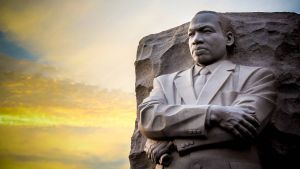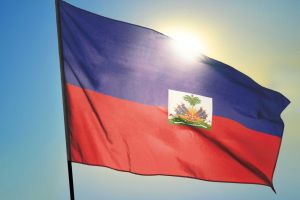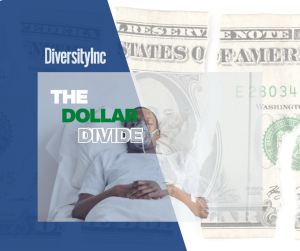Jason Marshall entered a career in law enforcement as bright-eyed and bushy-tailed as any new recruit ready to change the world. But like so many others, the reality was that the world had changed him after just a couple of years.
The nature of law enforcement work quickly caught up to Marshall as his naivety and optimism were soon replaced with a cynicism he describes as “unhealthy.”
“As much as I tried to fight it, the reality was that my job was extremely negative,” Marshall said. “Seeing the fights, abuse, accidents, deaths, (the effect of) drugs, alcohol and people regularly lying to avoid getting into trouble. I began to look for a way out.”
At first, Marshall, a member of the Sault Ste Tribe of Chippewa Indians, was hesitant to make any drastic changes as he lived in his hometown, close to family and friends, so he began investigating online MBA programs that could help him start a new chapter in a different profession. After meeting his now wife, Brittany, things started to change for Marshall and when she left to attend Western Kentucky University. In the end, the desire to be with her was too great, so Marshall decided to resign from law enforcement and join her at the university.
Despite leaving law enforcement, Marshall took some important lessons away from his time as an officer.
“The biggest lessons from my time in law enforcement relate to emotional and social intelligence, which are key elements of leadership,” Marshall said. “Officers’ emotions often set the tone for their social interactions. To keep an interaction moving in a positive direction, without escalating, I had to learn to keep my emotions under control. However, sometimes being too calm would actually be aggravating to the person to whom I was speaking. That’s where social intelligence came into play. My default was to remain calm, but I had to constantly observe the other person (or people) to see the effect that my words, tone, posture and actions were having on others and adjust accordingly. It was a constant game of chess.”
Through the MBA program at Western Kentucky, Marshall was able to have some life-changing experiences.
One opportunity he reflects on was the chance to join members of WKU’s EdD program on a trip to Lyon, France for an international business symposium, in which professors from around the world would teach three-day seminars on their particular areas of expertise.
“Not only was this my first time out of the country, it also provided a chance for me to get to know Dr. Randy Capps, who led the trip for WKU students,” Marshall said. “After the trip, Dr. Capps invited me to work with his consulting firm, Leadership Strategies Group, as an independent contractor. At first, I conducted 360-degree assessments and surveys in the manufacturing and healthcare industries. Then I began doing leadership training and leadership coaching for clients in manufacturing, healthcare, government and education. After a few years, I decided to start my own consulting business and that’s when things really began to take off.
His business, known as Amoeba Leader, has allowed Marshall to let his personality shine through, something that has helped him land bigger and longer contracts with clients than a more formal or traditional business approach.
Why Pursue a PhD?
For Marshall, the success of his own business was satisfying, but while he enjoyed coaching, speaking and training leaders, he found himself emerging from the experience with more questions about leadership than he could answer on his own.
“The more questions that emerged, the more complicated they got, eventually surpassing my ability to answer them,” Marshall said. “Getting a Ph.D. was the logical next step to develop the necessary skills to answer my leadership questions.”
But beyond seeking an answer to his own questions, Marshall credits The PhD Project with planting the seed in his mind to pursue a doctoral degree.
“They planted the initial seed with their persistent yellow postcards and, ultimately, I attended the annual conference in Chicago,” Marshall said. “Prior to that, I had never considered a Ph.D. My impression was that PhD research consisted of working really hard to throw a little crumb into a pie dish, but nobody seemed concerned with making a pie. In other words, I wasn’t sure that I wanted to spend years of my life researching something hyper-specific if nobody was going to use it to affect actual change.”
Despite his preconceived notions, Marshall pressed forward, confident that attaining a doctorate would help answer his leadership questions. He earned a Ph.D. in Leadership and Organizational Science from Binghamton University, something he now views as the natural progression of the goals he had when he started his career in law enforcement.
“I started my career wanting to make the world a better place and that hasn’t changed,” Marshall said. “I was drawn to this because leadership and organizational science can be applied in nearly any domain because the topics are relevant in so many areas. Understanding leadership and organizational science make it possible to have a profound impact throughout society.”
These days, Marshall shares his expertise as an educator, working in Creighton University’s Heider College of Business as an Assistant Professor of Management. Working with young people has been a positive experience as he gets to tap into their enthusiasm and passion while simultaneously helping them overcome their greatest weakness, a lack of experience.
The PhD Project’s Annual Conference
Marshall cites the annual conference as a key moment in his career and it’s something he’s proud to have taken part in as a speaker over the years. This year, the conference is set to take place on March 24 and 25.
“The PhD Project changed my life,” he says. “The annual Chicago conference brings together students and faculty from various business disciplines to share their experiences with prospective Ph.D. students. The conference gives those students a sneak preview of the entire Ph.D. lifecycle including tips on how to prepare for the GMAT or GRE, 1-on-1 feedback sessions on Ph.D. application packets, insights into the different disciplines, first-year papers, comprehensive exams, dissertations, the job market and alternative pathways post-PhD.”
Additionally, dozens of highly rated business schools participate in a recruitment fair so prospective students can meet with university representatives to learn more about their particular programs.
Just as important, the conference introduces prospective students to The PhD Project family, a support network from the time someone is a prospective student all the way until they retire. There are student associations for each discipline to help students through each step of the doctoral journey.
One caveat, the conference is invitation only. To be considered, those interested in attending must hold a minimum of an undergraduate degree or be entering their senior year of college by the time they attend the conference. The PhD Project is a diversity initiative for Black/African American, Latinx/Hispanic American and Native Americans. The deadline for application is Feb.12.
For more information, email Cristina Pazos at cpazos@kpmg.com
















